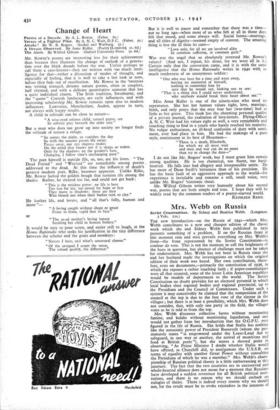Change of Heart
Poems of a Decade. By A. L. Rowse. (Faber. 6s.)
MR. RowsE's poems are interesting less for their achievement than because they illustrate the change of outlook of a genera- tion over the black decade before the war. Unfair perhaps to call them a case-history—they are written with too much intel- ligence for that—rather a dissection of modes of thought, and especially of feeling, that it is well to take a last look at now, before they fade out of recollection. Mr. Rowse in the 'twenties was writing tranquil, dreamy nature poems, often in couplets, half rhymed, and with a delicate quantitative scansion that has a quite individual charm. The Irish tradition, Swinburne, and the " queer " Cornish landscape, are early influences, and with increasing scholarship Mr. Rowse remains open also to modern influences: Lawrence, Montherlant, Auden, appear in turn, not always with happy results.
A child in solitude can be close to nature- " A wise-eyed solemn child, tanned gypsy, see In solitary play beneath the elder tree."
But a man who does not grow up into society no longer finds the solitude of nature a refuge.
" So comes the night, so vanishes the day So with the seasons passes life away; Passes away, nor any impress makes On the mind that knows not if it sleeps or wakes. Only by the shadows on the garden's face, Changing, I follow time's unchanging pace."
The poet himself is outside life, so, too, are his loves. " The Dead Friend " and " Waylaid " are remarkable among poems addressed to the dead. At .this time the influen:e of death's greatest modern poet, Rilke, becomes apparent. Unlike Rilke, Mr. Rowse lacked the golden bough that sustains life among the shades. Rather, he strayed too far, and could not get back: " This is the stricken grove : no life is here Too late for joy, too proud for hope or fear They move as shadows: these are they Who blench not when their bodies turn to clay."
He loathes life, and lovers, and " all that's folly, human and inane "— " A loving couple without shape or grace
Front to front, vapid face to face " Or
"The uslal mother's loving lunacy Suckling her child in human foolery."
It would be easy to pour scorn, and easier still to laugh, at the Homo Rationalis who seeks his justification in the tiny difference between the scholar and the goats and monkeys : " Nature I hate, and what's unnatural choose."
" Of the urequal I assert the sense, The valued quality, the difference." But it is well to pause and remember that there was a time— not so long ago—when most of us who felt at all in those days felt that mood, and some always will. Social forms—marriage, and all titles of dignity—seemed empty of content. The amazing thing is less the ill than its cure- " Love only, for all we are involved alike In common suffering, in common guilt."
Was war the angel that so absolutely reversed Mr. Rowse's values? (And not, I repeat, his alone, for we were all in it.) Certain only that the conversion came, and it is with the same intelligence that the Homo Rationalis writes in 1940 with so much tenderness of an anonymous soldier :
" One who was here for a time and went away, leaving no memorial of himself, nothing to remember him by save that he would say, looking out to sea: ' That is a thing that I could never understand, why anybody should break their heart about me."
Miss Anne Ridler is one of the ninety-nine who need no repentance. She has her human values right, love, marriage, birth, and only prays that she may fear her (war-time) bed as • little as her grave. This book has the charming personal quality of a private journal, the exaltation of love-letters. Flying-Officer A. N. C. Weir had his values right as well, a very remarkable and touching thing to find in a youth who barely reached his majority. No vulgar enthusiasm, no ill-bred confusion of duty with senti- ment, ever had place in him. He had the makings of a pure style, reminiscent at its best of Housman- " There is a death, Elizabeth, for which we all must wait and men and war can do no more than try to change the date—" I do not like Mr. Rogers' work, but I must grant him certain strong qualities. He is too rhetorical, too fluent, too hard- hearted. He falls into bad allegory and irresponsible satire. He has more of Dean Swift's bitterness than of his precision. He has the basic fault of an aggressive approach to the world—for experience is inviolable and remains a still, small voice, very unlike Mr. Rogers' histrionic shout.
Mr. Wilfrid Gibson writes very humanly about his second war, poems that are both simple and true. I hope they will be widely read by the common readers of a poetry-starved world.
KATHLEEN RAINS.






















 Previous page
Previous page